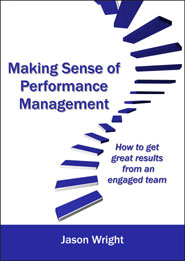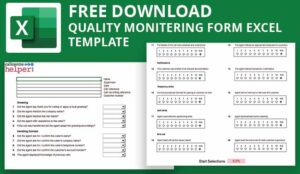In this week’s double header we ask the question: are job appraisals outdated and is there a better option?
Jason Wright explores the argument that appraisals are outdated, and talks about how to create value from the process by conducting them in a fresh and inspiring way.
One of the funniest sketches from the BBC comedy series The Office was the scene in which David Brent conducts a performance appraisal with Keith from Accounts.
David Brent labours his way through a series of fairly pointless and meaningless questions to simply satisfy a box-ticking, form-filling exercise using the standard company appraisal template. Whilst the outcome is, quite frankly, hilarious, watching it started me thinking.
I wonder how many appraisals that take place every day in businesses up and down the country, and even around the world, sound and feel much like this one? After all, comedy tends to take its inspiration from real life.
In the teams I have worked in, and with, I have seen plenty of evidence to suggest that we are blessed with many talented and capable managers in our businesses. However, are they blessed with the best tools to support them in getting the best from their own abilities to enhance the capability of others? Or indeed the best development and coaching to get the best from the tools provided?
I suppose it would be easy to blame the tools, or the process, but no doubt we have all been told that it is only a bad worker who would do such a thing! Changing the tool may sound an obvious fix – but that’s not so straightforward.
And even with a better tool would David Brent have executed Keith’s appraisal any better? Yes, there have been many incarnations of the appraisal process over the years – and there will doubtless be many more in future – but essentially they always boil down to the same thing, which is precisely why some people argue that the whole concept is outdated and in need of fresh inspiration. But where should this injection of inspiration come from?
Are the appraisal forms dry and repetitive?
The interesting thing to reflect on here is the interaction between the worker and the tool – and the way we, as more senior leaders, set up that interaction. The point is that just because the forms may be dry or repetitive and need a lot of filling in, the experience we deliver to our most precious commodity – our front-line agents – need not be the same.
Consider this. How many exciting and inspiring application forms have you ever been asked to complete? And yet, how does an effective sales person use that application form? Most likely they don’t refer to the form at all until the sale is safely completed and then the paperwork is simply a means of recording the appropriate information to enable that sale to be fulfilled. Can managers learn a lesson from this to help them when conducting appraisals?
The sales process is all about engaging with a customer and delivering a personalised, compelling proposition that motivates them to take positive action – namely the purchase of a product or service.
The objective – performance improvements
Surely appraisals should be conducted in much the same way, and with the same objective – to take positive action that will achieve an improvement in performance outputs. Aligning the appraisal process to a sales process focuses the manager on the inputs that will drive the performance outputs – rather than seeing a completed form as an output in itself, just so that it can sit in a filing cabinet in case it is required as ‘evidence’ at some future point in time.
So we can quickly reach the conclusion that the style a manager adopts is the real key to successful appraisals.
How can we identify what that style should be? Clearly it must be tailored to the individual who is the subject of the appraisal.
By making every experience unique we will be able to create much more value and engender greater people engagement from our appraisals.
This immediately renders a stereotypical, form-filling style of appraisal outdated and obsolete – but creates an opportunity for us to breathe new life into the practice of appraisals by adopting a different approach that is fresh and inspiring. Of course, we will still be required to complete paperwork to support our follow-up and record the progress being made by the people in our team – but this formal part of the appraisal process ceases to be the most important aspect.
Now the more informal aspects can begin to take on greater significance.

People tend to be much more effective in finding out information– and much more willing to share information – in an informal setting. Most social interactions are informal – a morning coffee, a bite to eat at lunchtime, a drink after work… But it is on these occasions that we get to know people well, we learn how to relate to them and find out what’s important to them – their likes and dislikes, their background, their family, their goals and aspirations and other facets of their personality that we may never have known otherwise. This information deepens our relationship with them and helps us to establish common ground that gives us a basis for furthering that relationship in future.
The lesson is not that we should conduct our appraisals in the pub or the coffee house – but that we should seek to develop a productive relationship based on common ground and a mutual understanding. When the manager-subordinate relationship is established in this way, the trust and honesty that will underpin the relationship is certain to make appraisals much more valuable and productive. The impact will be positive and can be measured in the performance success across the team.
Jason Wright is a centre manager in the financial sector. He is also the author of the book “Making Sense of Performance Management: How to get great results from an engaged team” which is based on the practical, day-to-day experiences he has gained throughout his management career.
The book is available from bookshops and online
Written by: Jason Wright
Sarah-Jane Heber-Hall shares her thoughts on the argument.
In our opinion, from both internal feedback and direct feedback from our clients and customers, appraisals are still relevant and a vital performance tool that any organisation can use.
Appraisals offer the agent opportunities to discuss:
- What they are doing
- Why they are doing it
- How their performance affects the company as a whole
- How they can improve their performance
Companies that operate regular appraisals or performance reviews, as they are also called, have found that investing in time, attention and in some cases, technology to help them expedite the process and manage their findings by statistical or reporting means, have reaped their own rewards.
The key to success appears to be in making these appraisal sessions specific, timely and useful to all parties involved.
Let the agent take the lead
Making it an interactive experience also helps. One leading contact centre allowed their staff to listen to the calls that they were going to be appraised on prior to the session. This allowed the agent to be more scathing in their interpretation of these specific highlighted performance snapshots than the team leader carrying out the appraisals would ever be.
This made the appraisals more focused and productive, and the agents felt more prepared and less defensive as a result. They had already anticipated what the feedback was likely to be, and were prepared to look at ways to improve, or adapt their specific skills where necessary. Hearing about the good aspects of their performance and being praised for them was also motivational and positive.
A two-way process
Always remember that it is a two-way opportunity for the employee to obtain feedback on their performance and also for them to communicate to management, via the person carrying out the appraisal. For this to happen, these sessions need to be considered confidential by the employee so that they feel that they can speak freely during the session, without recrimination.
They should be given an opportunity to feed back information to the appraiser too, so that management can learn about current staff morale issues, internal feedback, requests for training or coaching, opinions and views of their staff and other details relevant to the operational effectiveness of the business. Always make time in the appraisal for the employee to give feedback and ask questions, so that they realise it is a two-way process.
Monitor performance throughout the company
By monitoring performance throughout the company, it is possible to compare and contrast individuals, teams and departments and produce reports and statistics based around the performance results. The benefits of these findings not only ensure that the company is operating effectively, but they can also be directly fed back to employees for motivational purposes (for example, where examples of good performance are made available to all).
Written by: Sarah-Jane Heber-Hall is Operations Director at ComputerTel
Author: Guest Author
Reviewed by: Jo Robinson
Published On: 27th Oct 2010 - Last modified: 18th Feb 2026
Read more about - Call Centre Management, Employee Feedback, Management Strategies, Team Management





































Another informative article